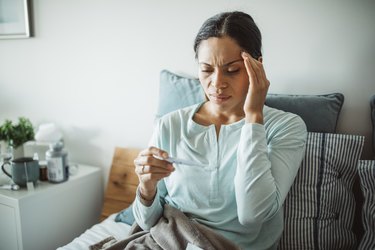
You felt all achy. Chilly and feverish. Headache-y. Nauseated. Or your arm just hurt. These are all possible side effects of the COVID-19 vaccine, according to the Centers for Disease Control and Prevention.
The talk surrounding side effects is that these are all good things — and may be a sign that your immune system is ramping up and ready to take on the virus that causes COVID-19 should it encounter it in the future.
Video of the Day
Video of the Day
While vaccine side effects, in general, are mild and short-lasting, can their presence tell you anything else about what's going on in your body? We talked to an infectious disease expert to find out what it all means.
Get tips on how to stay healthy, safe and sane during the novel coronavirus pandemic.
1. You Responded to the Vaccine
Simple enough, right?
"Side effects occur either because your body's immune system is reacting to the vaccine itself or a component of that vaccine," Luis Ostrosky-Zeichner, MD, infectious disease specialist at McGovern Medical School at UTHealth in Houston, tells LIVESTRONG.com. "We don't know if it's your body making the antibodies or if your body is reacting to one of the lipids or preservatives in the vaccine."
So, while having side effects may feel reassuring, it's not the best measure of how well your body responded (or didn't).
2. You May Have Had COVID Before
One of the cool things that's come out of recent research is that people who have had COVID-19 may have a more robust reaction to the first dose of the vaccine (if you're getting the two-dose Pfizer or Moderna).
"Research is ongoing, but one dose may be enough to boost the body's own natural immune system in people who have had past COVID-19 infections," Dr. Ostrosky-Zeichner says. (One recent study on this was published in April 2021 in Science Immunology.)
In that event, your immune system may be primed to respond to the vaccine and you may be saddled with stronger side effects, suggests preliminary research on the mRNA vaccines. (This study was not peer-reviewed, so more research is needed.)
3. It Could Have Something to Do With Your Age or Sex
In general, older adults report fewer side effects compared to those in a younger age group (under age 55 or 65, depending on how this was broken up in the clinical trials).
What's more, people assigned female at birth (AFAB) may respond differently than people assigned male at birth (AMAB). Notably, people AFAB made up the majority of the anaphylactic reactions in the most recent data available on the Moderna and Pfizer vaccines, published in JAMA Insights.
And that's not unique to the COVID vaccine. People AFAB typically have a more robust immune response. In fact, a December 2013 study in Vaccine found that four times as many women as men (that's the language the study used) ages 20 to 59 reported allergic reactions after getting the 2009 flu vaccine, even though more men got that shot.
It's not totally clear why this is the case, but it may have something to do with genetics or the way sex hormones affect the immune response. In the case of the COVID shot, it could also have to do with how the vaccine is broken down in the body.
4. You May or May Not Have Side Effects From Your Second Shot
In general, people tend to have a more robust reaction to the second vaccine dose, Dr. Ostrosky-Zeichner says. That said, if you had side effects from your first shot, it doesn't mean you'll definitely react to the second. Still, prepare yourself anyway.
"When I talk to patients, I tell them to schedule their vaccine on a Friday," he says.
5. You Shouldn’t Make Decisions Based on Side Effects
It's easy to try to read into what your side effects might mean. This is an anxiety-provoking time, and the vaccine offers hope of a return to normalcy.
Still, "people should not make decisions regarding risk of COVID based on the reaction they did or did not have following vaccination," Dr. Ostrosky-Zeichner says.
For example, if you suspect you had COVID before, got your first Moderna or Pfizer dose and were stuck in bed all day afterward feeling ill, you can't assume you're now totally protected. Stick to the CDC's guidelines about what to do when you're fully vaccinated, get your second dose (if applicable) and ask your doctor if you have any questions about whether or not certain activities following vaccination are OK for you.
Read more stories to help you navigate the novel coronavirus pandemic:
- Science Immunology: "Distinct antibody and memory B cell responses in SARS-CoV-2 naïve and recovered individuals following mRNA vaccination"
- Centers for Disease Control and Prevention: "Possible Side Effects After Getting a COVID-19 Vaccine"
- medRxiv: "Robust spike antibody responses and increased reactogenicity in seropositive individuals after a single dose of SARS-CoV-2 mRNA vaccine"
- Centers for Disease Control and Prevention: "Local Reactions, Systemic Reactions, Adverse Events, and Serious Adverse Events: Pfizer-BioNTech COVID-19 Vaccine"
- Centers for Disease Control and Prevention: "Local Reactions, Systemic Reactions, Adverse Events, and Serious Adverse Events: Moderna COVID-19 Vaccine"
- Vaccine: "Immediate hypersensitivity reactions following monovalent 2009 pandemic influenza A (H1N1) vaccines: Reports to VAERS"
- JAMA Insights: "Reports of Anaphylaxis After Receipt of mRNA COVID-19 Vaccines in the US—December 14, 2020-January 18, 2021"
Is this an emergency? If you are experiencing serious medical symptoms, please see the National Library of Medicine’s list of signs you need emergency medical attention or call 911.